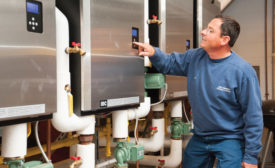Home » training technicians
Articles Tagged with ''training technicians''
Nexstar Coach’s Blog:
The Contractor’s Role in Workforce Development
Innovative contractors take steps to recruit new talent and fill the training gap
Read More
Study: HVACR Workers in High Demand
Reports detail critical need for mechanics and installers nationwide
November 2, 2015
Hydronics Zone: Revitalizing the Hydronics Industry’s Aging Workforce
Band together to develop the leaders necessary to carry the mechanical torch well into the future
Read More
ASA and FASA Offer Resources to Help Subcontractors Succeed
Catalog includes videos-on-demand and webinars
August 12, 2015
Ductless Demands Proper Training
Manufacturers and Contractors Take Advantage of Online Tools, Resources
Read More
Copyright ©2024. All Rights Reserved BNP Media.
Design, CMS, Hosting & Web Development :: ePublishing








